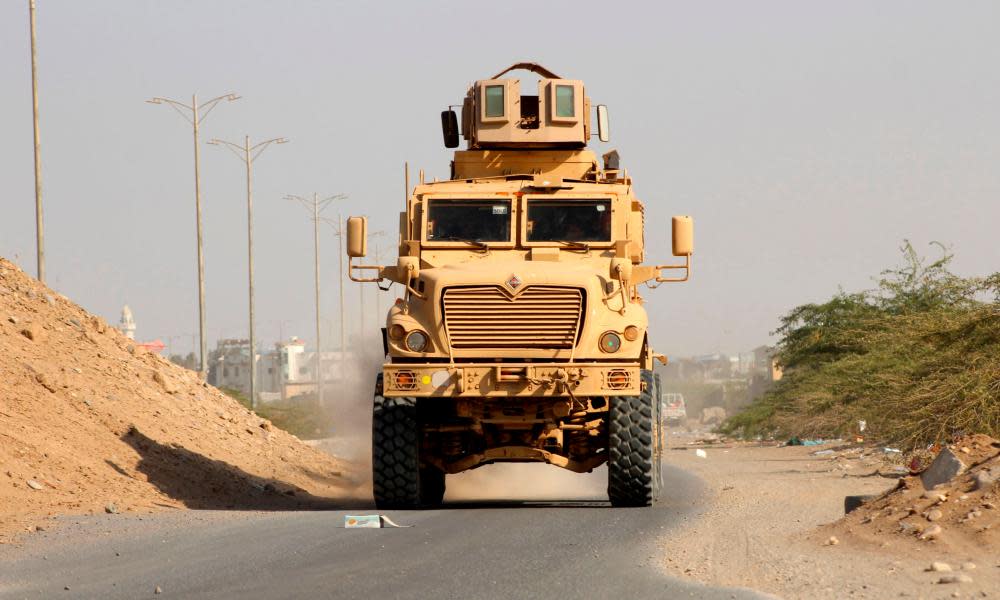Yemen: Saudi-led coalition orders halt to Hodeidah offensive

The Saudi-led coalition has ordered a temporary halt to its offensive against Houthi rebels occupying Yemen’s main port city, Hodeidah, officials have said, raising hopes that a more lasting ceasefire can be reached to end fighting that threatens to push the country into full-blown famine.
Saudi and UAE-backed militias were told to pause the 12-day-old assault until further notice, several Yemeni military officials said on Wednesday night, adding that the offensive would resume if the Houthis attacked coalition positions.
The coalition was prepared to restart its operation, known as Golden Victory, if progress towards new peace talks stalled, a source familiar with coalition operations said.
The decision appears to have been a response to calls from aid agencies for a cessation in hostilities, and to intense shuttle diplomacy efforts by the United Nations and the UK foreign secretary, Jeremy Hunt. The UN special envoy for Yemen, Martin Griffiths, is due to give a briefing on Friday.
Half of Yemen’s 28 million people are already on the brink of starvation and the country is suffering from the worst cholera crisis in modern history.
Humanitarian workers fear damage to Hodeidah’s Red Sea port – through which an estimated 80% of Yemen’s food, fuel and aid flows – will lead to the UN having to declare a mass famine.
Salem Jaffer Baobaid, an aid worker with Islamic Relief, said: “We managed to distribute food baskets and blankets today in the east of the city. The demand is very high. Some people who managed to leave for Sana’a [the Houthi-held capital] have had to come back to Hodeidah because they can’t afford the cost of living there.”
According to the UN, 92 civilians died in the first week of the new offensive on Hodeidah, and about 445,000 people have fled since the coalition reached the city’s outskirts in June.
The last round of talks aimed at ending Yemen’s almost four-year-old war, convened in Geneva in September, were cancelled after three days of waiting for a Houthi delegation that failed to arrive.
Among the stumbling blocks that scuppered the last negotiations was an unmet Houthi demand for the evacuation of wounded fighters to neighbouring Oman – a request that the coalition has since granted before fresh talks planned for the end of the month in Sweden.
Those talks received a boost on Thursday when the Saudi foreign minister, Adel al-Jubeir, agreed a deal to allow Houthi negotiators to attend, after a phone call with Hunt.
In the Red Sea city, violence has subsided to intermittent clashes in the last two days during sunset and a marked drop in coalition bombing, although one strike on Wednesday outside the city limits hit a bus carrying fleeing civilians, killing seven and wounding four.
Two shells reportedly hit the city’s al-Thawra hospital, local media and several residents said, damaging a building but causing no injuries. Many staff and patients able to move have already fled the hospital – Hodeidah’s last functioning medical facility – in the face of encroaching street fighting.
Al-Thawra’s intensive care unit was closed days ago and patients were transferred to Sana’a, where it is reported many could not find beds.
“It is quieter now but the fighting continues,” said a local, Ibrahim Seif. “A new worry is that employees at the port say the Houthis have started mining all of the entrances except one.”
Several coalition attempts to retake the city have been postponed over fears of a humanitarian disaster for both the city’s 600,000 residents and the rest of the country if aid supplies are cut off. Commanders believe that driving the Houthis out of Hodeidah will clear a path to Sana’a and bring the war to an end.
Despite the pause in the offensive, it is feared ground militias loyal to the exiled Yemeni government will still seek to gain as much ground as possible before talks are scheduled to start. “The battles will not stop, except with the liberation of Hodeidah and the whole west coast,” one military official told AFP.
The coalition’s leaders in Riyadh and Abu Dhabi, however, appear to have thrown their weight behind the efforts to restart the peace process. “We support a peaceful solution in Yemen and we support the efforts of the UN special envoy to Yemen,” Jubeir said on Thursday.
Abu Dhabi hosted a delegation from Yemen’s Muslim Brotherhood-affiliated Islah party on Wednesday, another sign that the coalition is seeking to break the political statemate.
Saudi Arabia in particular has come under renewed pressure from international allies to end its involvement in Yemen’s war after the murder of the Saudi journalist Jamal Khashoggi in the Saudi consulate in Istanbul last month.
Western governments, including the UK, have condemned Riyadh’s role in the killing but stopped short of punitive action such as halting the sale of arms and jets to the country, which are often destined for use in Yemen.
On Thursday Hunt told a House of Lords select committee: “We want to use every bit of influence we have because we are facing the most appalling catastrophe. There are 14,000 people getting cholera every week, 8.5 million people on the brink of starvation. This is the most appalling humanitarian crisis and we do not believe there is a military solution that is possible, we think there has to be a political process.”

 Yahoo News
Yahoo News 
